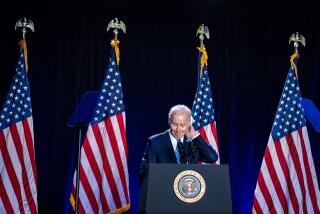Bradley Offers Farm Aid Amid Regrets
- Share via
CARLISLE, Iowa — Former Sen. Bill Bradley of New Jersey, now a Democratic presidential candidate, conceded Friday that his views on farm issues have shifted over the years and said he regrets voting for the bill that ended most longtime farm subsidies.
“We shouldn’t have passed it until they put a safety net in place,” he said.
Bradley used a pristine farm setting to spell out a plan that would give $5 billion in cash payments to farmers during sour economic times and take as much as 42 million fragile acres out of production.
Aides to Vice President Al Gore, his rival for the Democratic nomination, noted inconsistencies in Bradley’s positions on farm issues. Questioned by reporters, Bradley conceded his shift after backing the Freedom to Farm Act that ended most traditional subsidies.
“When we passed it, they said they’d put a safety net [in place],” said Bradley. “They didn’t put a safety net on it.”
“I ended up supporting it, but it’s something that I regret.”
Bradley argued that his proposals, by targeting aid to small family farmers, do more than return to subsidies.
“These are fresh proposals; they are not going back to what was,” he said. “They are rethinking the issue.”
Bradley called for expanding a program known as the Conservation Reserve Program, which pays farmers to take environmentally sensitive land out of production. His goal is to have 42 million acres idle at a cost of $580 million a year.
He took some shots from Republicans, underscoring the increased attention his campaign is getting.
“From his support for crippling tax increases on rural Americans to his self-serving flip-flop on ethanol, Bill Bradley has shown he is no friend to family farmers,” said Republican National Committee Chairman Jim Nicholson.
As a senator, Bradley voted against the ethanol tax subsidy important to Iowans, but he says he supports it now as a candidate.
“To be honest with you, when I began this journey I didn’t know a lot about agriculture,” said Bradley, speaking to 40 people by an empty hog lot. “I had no idea of what the farm economy was all about. My teachers have been the family farmers.”
Bradley argued that taking certain acres out of production helps farmers economically by lowering the supply of grain and pushing up prices, and helps the environment by reducing erosion.
More to Read
Get the L.A. Times Politics newsletter
Deeply reported insights into legislation, politics and policy from Sacramento, Washington and beyond. In your inbox twice per week.
You may occasionally receive promotional content from the Los Angeles Times.










